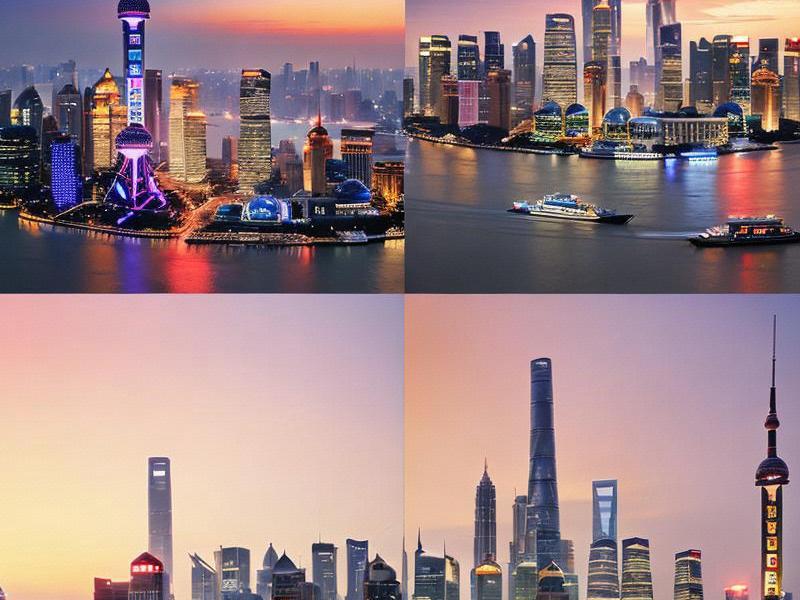
Shanghai, often referred to as the "Pearl of the Orient," stands as a beacon of modernity and tradition in China. This dynamic city, located on the eastern coast of China, has undergone a remarkable transformation over the past century, evolving from a modest fishing village into one of the world's most influential metropolises.
The journey of Shanghai is a testament to the power of urban development and economic reform. In the late 19th and early 20th centuries, Shanghai became a major international trading hub, attracting merchants and investors from around the globe. The establishment of the International Settlement and the French Concession in the early 20th century further cemented its status as a cosmopolitan city, blending Eastern and Western cultures.
Today, Shanghai is recognized as a global financial center, a hub for technology and innovation, and a cultural melting pot. Its skyline, dominated by iconic structures such as the Oriental Pearl Tower, the Jin Mao Tower, and the Shanghai Tower, symbolizes the city's rapid urbanization and economic prowess.
One of the key drivers of Shanghai's success is its commitment to innovation. The city has established itself as a leader in high-tech industries, including artificial intelligence, biotechnology, and information technology. The Zhangjiang Hi-Tech Park, home to numerous research institutions and start-ups, is a prime example of Shanghai's dedication to fostering a thriving innovation ecosystem.
The city's government has implemented various initiatives to support technological advancement and entrepreneurship. For instance, the Shanghai Free-Trade Zone (FTZ) provides a favorable environment for businesses, offering tax incentives and streamlined regulatory processes. This has attracted a significant number of multinational corporations and innovative companies to set up operations in the city.
爱上海论坛 In addition to its economic achievements, Shanghai is renowned for its rich cultural heritage and vibrant arts scene. The city boasts a diverse array of museums, galleries, theaters, and cultural institutions that celebrate its unique blend of traditional Chinese and Western influences. The Shanghai Museum, with its extensive collection of ancient Chinese art, is a must-visit attraction for art enthusiasts.
The city's cultural scene is further enriched by its numerous festivals and events. The Shanghai International Film Festival, one of the oldest and most prestigious film festivals in Asia, attracts filmmakers and audiences from around the world. Similarly, the Shanghai Fashion Week showcases the latest trends in fashion, highlighting the city's role as a global fashion capital.
Shanghai's commitment to preserving its historical landmarks while embracing modernity is evident in its urban planning. The Bund, a historic waterfront area, offers stunning views of the futuristic skyline across the Huangpu River. This juxtaposition of old and new is a defining characteristic of Shanghai, reflecting the city's ability to harmonize tradition with progress.
The city's infrastructure continues to evolve to meet the demands of its growing population and economy. The Shanghai Metro, one of the most extensive and efficient metro systems in the world, provides convenient transportation for millions of residents and visitors. The ongoing expansion of the metro network aims to further enhance connectivity and accessibility across the city.
新上海龙凤419会所 Shanghai's role on the global stage extends beyond its economic and cultural achievements. The city has been actively involved in international diplomacy and cooperation. As a member of the World Expo Organizing Committee, Shanghai successfully hosted the 2010 World Expo, attracting millions of visitors and showcasing its commitment to sustainable development and global collaboration.
The Expo's theme, "Better City, Better Life," resonated with the challenges and opportunities facing urban centers worldwide. It highlighted Shanghai's innovative approaches to urban planning, environmental sustainability, and social inclusivity. The legacy of the Expo continues to influence the city's development, driving advancements in smart city technologies and sustainable urban living.
Shanghai's educational institutions also play a crucial role in shaping the city's future. Renowned universities such as Fudan University and Tongji University attract students and researchers from around the globe, fostering a vibrant academic community. These institutions are at the forefront of research and innovation, contributing to the city's intellectual capital and global competitiveness.
The city's leadership in sustainability is another area of significant achievement. Shanghai has implemented various initiatives to reduce carbon emissions, promote renewable energy, and enhance environmental quality. The construction of green buildings, the expansion of public transportation, and the promotion of waste recycling are some of the measures undertaken to crteeaa more sustainable urban environment.
上海龙凤阿拉后花园 Shanghai's transformation into a global metropolis is not without its challenges. Rapid urbanization has brought about issues such as housing shortages, traffic congestion, and environmental concerns. However, the city's proactive approach to addressing these challenges underscores its commitment to sustainable development and the well-being of its residents.
The future of Shanghai holds immense potential as the city continues to evolve and adapt to the changing global landscape. With its strong foundation in innovation, culture, and international cooperation, Shanghai is well-positioned to remain a leading global city. The city's vision for the future includes further advancements in technology, a continued emphasis on cultural exchange, and a commitment to creating a sustainable and inclusive urban environment.
In conclusion, Shanghai stands as a testament to the power of urban development and economic reform. Its journey from a traditional port city to a global metropolis is a story of resilience, innovation, and cultural richness. As Shanghai continues to grow and thrive, it remains a symbol of China's rise on the global stage and a source of inspiration for cities around the world.
